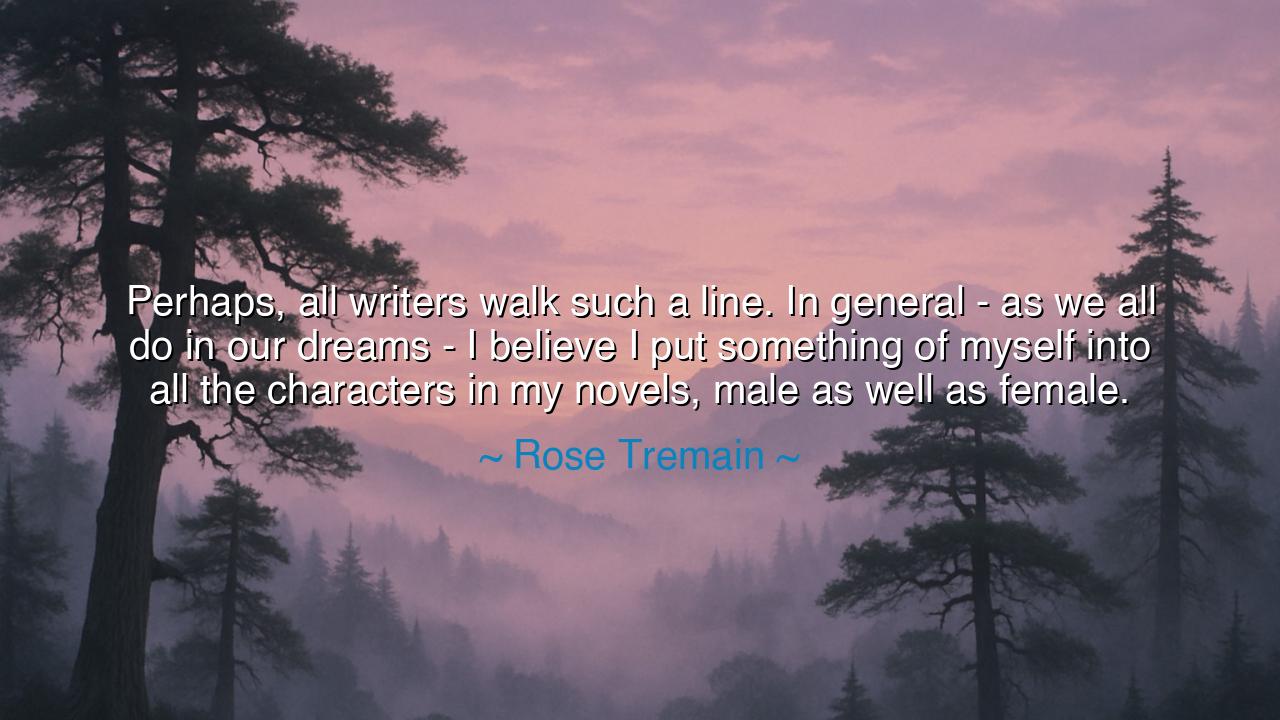
Perhaps, all writers walk such a line. In general - as we all do
Perhaps, all writers walk such a line. In general - as we all do in our dreams - I believe I put something of myself into all the characters in my novels, male as well as female.






Hearken, children of reflection, and attend to the words of Rose Tremain, a voice attuned to the delicate art of creation and the human soul: “Perhaps, all writers walk such a line. In general—as we all do in our dreams—I believe I put something of myself into all the characters in my novels, male as well as female.” Pause upon these words, for they reveal a profound truth about the nature of storytelling, imagination, and the subtle threads that bind the author to the world they create. Every character, every voice, carries within it a fragment of the creator’s soul.
Tremain begins with the recognition of the writer’s intimate engagement with their craft. To walk the line between observation and imagination, between reality and invention, is the path of the storyteller. In dreams, as in writing, the self merges with otherness, and the author breathes life into characters who may differ in age, gender, or circumstance. Yet within each, there lies a spark of the author’s own hopes, fears, and experiences, forming a bridge between the self and the imagined world.
History offers mirrors of this truth. Consider Homer, the ancient poet whose epics endure through millennia. In the voices of Achilles, Odysseus, and Penelope, one can detect glimpses of the human heart in all its complexity: courage, longing, doubt, and wisdom. Homer’s genius lay not only in the grandeur of tale but in the infusion of his own understanding of humanity into each character. Tremain’s reflection echoes this timeless insight: the act of creation is inseparable from the self.
Even in more recent literature, the principle persists. Jane Austen, in the creation of Elizabeth Bennet or Mr. Darcy, interwove observations, humor, and reflection drawn from her own experiences and perceptions. Every author, Tremain suggests, walks this subtle line, placing fragments of their intellect, emotion, and perspective into each character, male or female, shaping the narrative as an extension of the self. Writers thus become conduits, translating the human soul into voices and deeds upon the page.
The essence of Tremain’s insight lies in the universality of empathy and imagination. To inhabit another’s perspective—whether through gender, class, or circumstance—is to recognize shared human truths. The author’s self-infused presence does not limit the character; rather, it grants authenticity and depth. The ancients understood that storytelling is an act of communion: through the characters, the writer engages readers in a shared exploration of the heart, mind, and spirit.
Practical wisdom emerges from this reflection. Whether in writing, teaching, leadership, or conversation, invest a piece of yourself in the work you undertake. Reflect upon your experiences, values, and insights, and let them inform your expression. The authenticity that arises from this infusion of self creates resonance, understanding, and connection with others. Tremain’s counsel reminds us that creativity is most potent when rooted in awareness of self and empathy for others.
Moreover, this reflection calls for the courage to explore the multiplicity of the self. Just as Tremain writes into male and female characters alike, so must we acknowledge the diverse facets of our own being. Understanding and embracing the complexity of our thoughts, emotions, and desires allows us to navigate life with greater empathy, wisdom, and depth, and to infuse our actions with authenticity.
Therefore, generations to come, remember Rose Tremain’s counsel: writers, like dreamers, place themselves within their creations. In every act of imagination, every expression of thought, let a piece of your self illuminate the world. Engage with empathy, honesty, and reflection, and through your work—be it literary, artistic, or otherwise—you create a bridge between the self and the shared human experience, enriching both those who create and those who encounter it.
If you wish, I can also craft a more poetic, mythic version of this reflection, portraying the author as a dream-weaver, placing fragments of the soul into characters that live and breathe across time, suitable for meditative or dramatic narration. Do you want me to do that?






AAdministratorAdministrator
Welcome, honored guests. Please leave a comment, we will respond soon